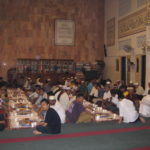It has been a couple of years since I read through this book, and then, rather quickly. I was impressed by Asad’s intellect, and so I would, before all else, heartily recommend this book to any Muslim who is concerned about the direction that Islam is to go in, or any non-Muslim who wishes to see that, especially, Islam can be progressive and relevant to the 21st century.
Early Life of Muhammad Asad
Muhammad Asad was born a Jew, the child of a long tradition of Rabbinical scholarship. His education was first-rate in both religious and secular literature, but he excelled in the study of Eastern languages. His book, Islam at the Crossroads, was written in the 30s but was revised to correct some misconceptions.
 The book’s thesis is that Islam, and especially the Qur’an, are relevant to the world and are a critical alternative to the dominance of Western thought. The book first goes through an exhaustive condemnation of the materialism that impregnates and corrupts Western Civilization. This is both a practical and a spiritual critique that is very trenchant, considering the way many Islamic nations have embraced Western materialism as whole.
The book’s thesis is that Islam, and especially the Qur’an, are relevant to the world and are a critical alternative to the dominance of Western thought. The book first goes through an exhaustive condemnation of the materialism that impregnates and corrupts Western Civilization. This is both a practical and a spiritual critique that is very trenchant, considering the way many Islamic nations have embraced Western materialism as whole.
Asad’s insightful message
In contrast to this, Asad offers a very insightful message that an Islamic world-view would be most efficacious and pertinent to the sciences, especially. But what it would require is a return to the future. In the past, during that golden flowering of Islamic culture, Islam was able to be creative, tolerant, intellectually vital, constructive. Existing in the shadow of the Western reformations, the enlightenment and the rise of materialism with its concurrent accent on the industrial, the technological and the scientific, Islam has foundered on almost medieval insecurity.
Islam, suggests Asad, should utilize its inherent values to re-create that golden age of Islam, where it can once again be at the forefront of science and culture. But this relevance requires something of Islam. It requires moving along a track of modernism and progressive thinking. Vitality and creativity are the hallmarks of a growing and flourishing Islam. A willing and brilliant desire to radically re-new itself is the key to this growth.
The Success of Asad’s Book
Asad’s book was an instant success in the 30s and was the leading voice in what we now refer to as a moderate Islam, one focused on bringing a spiritual and moral aegis around culture and science.






